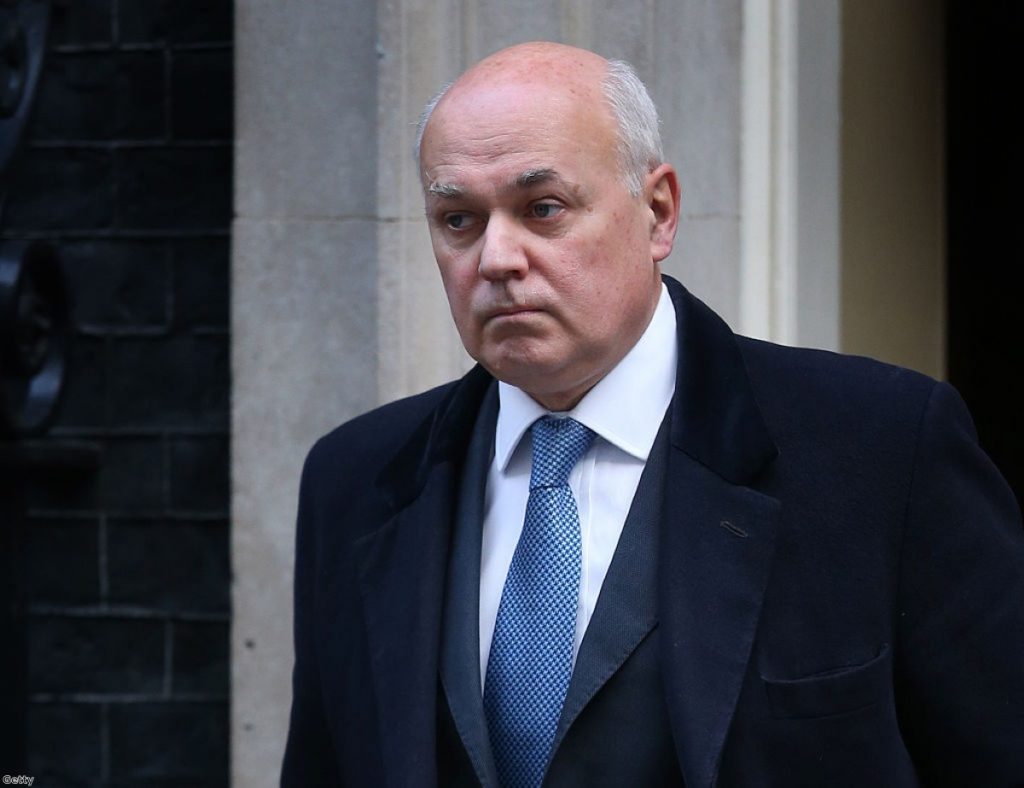IDS and the new age of political chaos
Iain Duncan Smith's shock resignation on Friday night is just the latest stage in a unique period of British political chaos. Both Labour and the Tories are now on the verge of tearing themselves apart. In both cases, the parties are aiming their guns inwards rather than across the aisle.
The Labour and Tory civil wars are now conducted entirely in the open. Often it’s on Twitter, the rest of the time it's in TV studios. Occasionally someone is good enough to give an old school anonymous quote to a reporter.
Labour's MPs can barely wait to get their fingers on their phones before tweeting their latest moral outrage at the behaviour of their leader, whether it’s because of a perceived failure to deal with anti-semitism, or his support for decriminalised sex work, or any of the other opinions or unforced errors he's responsible for. IDS' outspoken resignation has similarly triggered a wave of astonishingly open attacks on the Cameron-Osborne leadership team.
Bernard Jenkin said "everything is dictated from the top for short-term political advantage". Sarah Wollaston said he made a "compelling case". Andrew Percy called on the party to remember "its basic values". IDS' former department basically fell into its own internal civil war.
Compelling case from #IDS on social justice & priorities for Govt #Marr
— Sarah Wollaston MP (@sarahwollaston) 20 March 2016
It was impossible for #IDS to defend #PIP changes whilst tax was being cut for wealthy. He was right to refuse to do so & to resign
— Sarah Wollaston MP (@sarahwollaston) 20 March 2016
These battles are partly strategic. Centrist Labour MPs – which is almost all of them – want a professional approach by the Corbyn team, with weaponised, oft-repeated political messaging on issues where there is clear public support and an end to the cultivating of crackpot minority conspiracy theories. IDS' attack was almost the exact opposite: that the Tory election-winning machine has betrayed the principles the party needs to survive. His Andrew Marr interview criticised the chancellor for imposing a political timetable to implement disability benefit cuts in order to abide by an arbitrary welfare cap. He is berating the Tory leadership for becoming so weaponised in its messaging that it is undermining its own stated commitment to social justice.
But Labour and Tory divisions have another similarity: both civil wars are about to what extent political parties need to reach out to voters outside of their comfort zones. Corbyn is attacked for being unable to reach out even to centrist Labour voters, let alone the Tory voters Labour needs if it is ever to get back into power.
IDS' criticism of Cameron and Osborne is similar. His point that the party is now unable to claim 'we're all in this together' is just another way of saying that the Tories can no longer claim to be appealing to voters outside of their narrow core support. The leadership's refusal to ever target pensions, even for the well off, while constantly hammering welfare is a sign of a party content to win elections on the back of a well-fed core support, rather than by expanding its base.
Labour's perceived weakness is actually fuelling the fire of the Tory civil war. If there was a disciplined Labour opposition, primed for power, Tory MPs might feel more reticence about expressing their discontent so publicly. But with Labour seemingly years from government, it frees rebels up to express themselves without having to feel they are betraying their own side. The same can be said for the Lords – which saw several government defeats last week alone – and the courts. When the opposition becomes weak, the other institutions which can hold government to account expand to fill the space.
These kinds of battles may get worse before they get better. Mainstream political parties – not just in Britain, but across the western world – are increasingly struggling to respond to the demands of the public. Partly, that is a result of social and economic classes which have outgrown the ones political parties are supposed to represent. Partly it’s due to the technological change altering voters' relationships with politics and the state, and their own economic circumstances. Partly, it is a result of a political system where the power of multinationals and supranational organisations have overruled that of domestic political parties.
Political parties increasingly resemble empty brands, seeking a reason to exist, rather than political movements. Across the Atlantic, Donald Trump is the obvious beneficiary of this trend. He may win the Republican nomination, but he is not in any real sense working for the Republican party. He's running for the Donald Trump party. Populist demagogues like this, whose way of talking resembles the instant options of social media, could rise up to take the space offered by a declining faith in political parties.
For now, both Labour and the Tories are about to go through an extraordinary period of war in which each party is its own opposition. It's possible that the Tories will firm up their discipline and let bygones be bygones once the EU referendum is over. Maybe Labour will find a way of jettisoning Corbyn by 2018 and installing a more press-friendly leader ahead of the next general election. Or we could be in a more interesting period, in which the Labour and Tory brands finally start to disintegrate and new political groupings emerge.





-01.png)